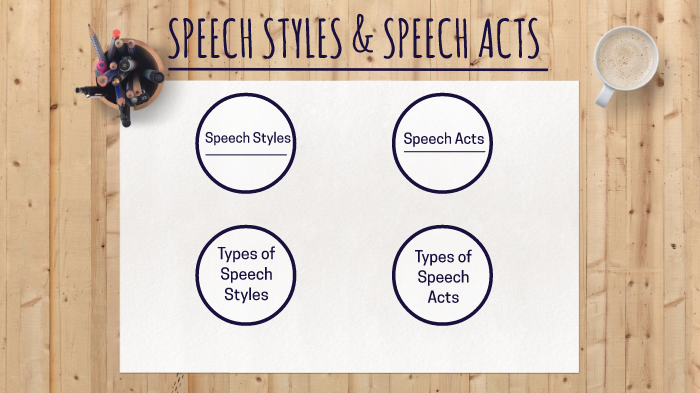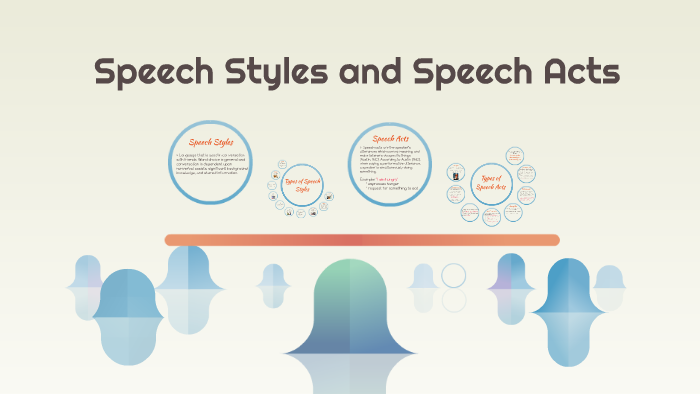What is the Difference between Speech Style And Speech Act?
Speech style refers to the manner in which a person speaks, while speech act refers to the intention or purpose behind the speech. In other words, speech style deals with the way something is said, while speech act deals with why it is said.
Now, let’s explore these concepts further. Speech style is the way in which individuals express themselves through language. It includes factors such as tone, pitch, volume, and speed of speech, as well as the use of certain words or phrases.
A person’s speech style can convey various emotions, attitudes, and intentions. On the other hand, speech act focuses on the function or purpose of speech. It examines what individuals aim to accomplish through their speech, such as making requests, giving commands, expressing opinions, or making promises. Speech acts are actions performed through speech, and they can have direct or indirect effects on others. By understanding both speech style and speech act, we can gain a deeper understanding of how individuals communicate and convey meaning through language.

Credit: prezi.com
Understanding Speech Style
Speech style and speech act have distinct differences. While speech style refers to the way language is used, speech act focuses on the intention behind the utterance. Understanding these nuances is crucial for effective communication.
Speech style and speech act are two important concepts in linguistics that help us understand how language is used in different contexts. While speech acts focus on the intended meaning behind a statement or utterance, speech style refers to the way language is used, including choices of words, tones, and forms of address. In this section, we will delve into the definition, characteristics, and examples of speech style to gain a better understanding of this linguistic phenomenon.
Definition Of Speech Style
Speech style, also known as linguistic style, refers to the particular way in which language is used by individuals or groups in a given context. It encompasses various aspects, including word choices, sentence structures, tones, levels of formality, and even nonverbal cues. Speech style can vary depending on factors such as the relationship between the speaker and the listener, the purpose of communication, cultural norms, and the social context. It plays a significant role in shaping how a message is conveyed and received.
Characteristics Of Speech Style
The characteristics of speech style can vary widely, as it is influenced by numerous factors. However, there are some common traits that can help us understand speech style better:
- Vocabulary choice: Individuals may use specific words or phrases that are unique to their speech style. For example, someone speaking in a formal style may use more academic or technical terms, while someone speaking in an informal style may use slang or colloquial expressions.
- Tone and intonation: The way a message is delivered can greatly impact its meaning. Speech style includes the use of different tones, such as authoritative, friendly, sarcastic, or persuasive, as well as variations in intonation, pitch, and rhythm.
- Formality level: Speech style can range from formal to informal, depending on the context and social norms. Formal speech style is characterized by more polite language, complete sentences, and avoidance of contractions, while informal speech style may include slang, abbreviations, and conversational language.
- Nonverbal cues: Speech style is not limited to verbal communication alone. Nonverbal cues, such as body language, facial expressions, and gestures, also play a significant role in conveying meaning and shaping speech style.
Examples Of Speech Style
To better understand speech style, let’s look at some examples:
| Speech Style | Example |
|---|---|
| Formal | “Good morning, ladies and gentlemen. I would like to present to you the findings of our latest research study.” |
| Informal | “Hey, guys! Check out this awesome video I found. It’s hilarious!” |
| Polite | “Excuse me, could you please pass me the salt?” |
| Authoritative | “You must comply with the regulations stated in this document.” |
| Persuasive | “Don’t miss out on this once-in-a-lifetime opportunity! Join our exclusive club and unlock incredible benefits.” |
These examples highlight the diverse ways in which speech style can be expressed and its impact on the overall message and perception of the speaker. Understanding speech style allows us to navigate different social contexts and communicate effectively with others.
Credit: www.quora.com
Understanding Speech Act
A speech act refers to the action performed by someone’s speech. It goes beyond the mere words spoken and includes the intention and impact behind the communication. In linguistics, understanding speech acts is essential in comprehending the intended meaning and the effect it has on the listener. There are two main components to consider when discussing speech acts: speech style and speech act. Let’s focus on the latter and delve into its definition, characteristics, and examples.
Definition Of Speech Act
The speech act can be defined as the action accomplished through using language. It refers to the act performed by an individual’s speech that goes beyond the literal meaning of the words. Speech acts convey intentions, messages, and effects, influencing the behavior and perceptions of others. When analyzing speech acts, it is crucial to consider the context, speaker, and listener to fully grasp the intended meaning and impact.
Characteristics Of Speech Act
Speech acts possess several characteristics that differentiate them from ordinary statements or conversations. These characteristics include:
- Intention: Speech acts are intentional. They are aimed at achieving a specific purpose, whether it is to request, apologize, persuade, assert, or express emotions.
- Effect: Speech acts have an effect on the listener or recipient. They can influence behavior, provoke reactions, convey information, or create understanding.
- Contextual Dependence: The meaning and interpretation of speech acts are heavily influenced by the situational context. The same words can have different speech acts in various situations.
- Performativity: Speech acts are performative, meaning they bring about the action they describe. For example, saying “I promise” actually makes a promise.
- Illocutionary Force: Speech acts have illocutionary force, which refers to the intended meaning behind the words spoken. It helps convey the speaker’s intention or purpose effectively.
Examples Of Speech Act
Below are some common examples of different speech acts:
| Speech Act | Example |
|---|---|
| Request | “Could you please pass me the salt?” |
| Apology | “I’m sorry for being late.” |
| Promising | “I promise to help you with your project.” |
| Asserting | “The sun rises in the east.” |
| Commanding | “Close the door, please.” |
| Complimenting | “You did an amazing job on the presentation!” |
Differences Between Speech Style And Speech Act
Speech style and speech act are two distinct concepts in linguistics. While speech style refers to the way language is used, including tone, formality, and choice of words, speech act focuses on the intention and impact of speech, such as making requests or giving commands.
Understanding the difference between these two is crucial in effective communication and interpretation.
In the realm of language and communication, understanding the difference between speech style and speech act is crucial. While both concepts are related to the way individuals express their thoughts and ideas through spoken words, they differ in their definition, focus, intent, purpose, form, structure, effects, and consequences.
Definition And Focus
Speech style refers to the manner in which an individual speaks, including their choice of words, tone, and pronunciation. It is influenced by various factors such as one’s cultural background, social status, and personal preferences. Speech style is tied to an individual’s identity and is reflective of their personality.
On the other hand, speech act focuses on the intended meaning and purpose behind a person’s speech. It goes beyond the literal interpretation of words and explores the underlying intentions, such as making a promise, giving an order, requesting information, or expressing gratitude. Speech act analysis aims to understand the communicative function of speech and the effects it has on the listener.
Intent And Purpose
The intent of speech style is to establish a connection with the audience, convey emotions, and express one’s individuality. It aims to create a particular atmosphere for communication, whether it be formal, informal, respectful, or humorous. Speech style can aid in building rapport and establishing a sense of trust between the speaker and the listener.
Speech acts, on the other hand, have a specific purpose and are intended to bring about a change in the social reality. Each speech act type serves a different purpose, such as persuading, informing, commanding, praising, or apologizing. The primary intent of a speech act is to influence the behavior, thoughts, or beliefs of others, and to elicit a response or action from the listener.
Form And Structure
Speech style takes into account the form and structure of language, including the choice of words, sentence structure, rhythm, and intonation. It encompasses various aspects of linguistic expression, allowing individuals to communicate their thoughts effectively. Speech style heavily relies on linguistic devices such as idioms, metaphors, and figurative language to convey meaning.
Unlike speech style, speech acts are characterized by their specific form and structure. Each speech act type follows a predefined linguistic pattern that is recognized and understood by speakers of the same language community. For example, an apology typically involves expressing regret, taking responsibility, and offering restitution, whereas a command often follows a subject-verb-object structure.
Effects And Consequences
Speech style has the power to shape social interactions and influence how others perceive and respond to the speaker. It can create a positive or negative impression, foster understanding or miscommunication, and impact the overall dynamics of a conversation. The effects of speech style can range from building trust and rapport to causing offense or misunderstandings.
Speech acts, on the other hand, have direct consequences on the social reality. Each speech act type triggers a specific response or action from the listener, and failing to fulfill the expectations associated with a particular speech act can lead to misunderstandings or conflicts. For example, if a request is not understood as such, it may result in a missed opportunity or a breakdown in communication.

Credit: www.coursehero.com
Frequently Asked Questions Of What Is The Difference Between Speech Style And Speech Act?
What Are The Different Speech Acts And Speech Styles?
Speech acts refer to the various types of actions performed through language, such as making promises or giving orders. Speech styles, on the other hand, are the different ways in which language is used, including formal, informal, or persuasive styles.
What Is The Meaning Of Speech Style?
Speech style refers to the way someone expresses themselves through language. It includes factors like tone, vocabulary, and grammar choices. Speakers can adapt their style to suit different situations, such as formal or informal settings. By being mindful of speech style, individuals can effectively convey their message and connect with their audience.
What Is Speech Act?
Speech act refers to the action performed when someone speaks, like making a promise or giving an order. It is a way to understand the intentions and meanings behind words. Speech acts can have real-world consequences and affect the way people interact with each other.
What Significance Does Speech Act Play With Speech Style And Speech Context?
Speech acts, speech style, and speech context are interrelated. Speech acts refer to the intention behind a speech. The speech style is the way it is delivered, while the speech context is the situation it occurs in. These three elements combine to give meaning and impact to communication.
What Is Speech Style?
Speech style refers to the way an individual speaks, including their choice of words, tone, and level of formality.
Conclusion
Understanding the difference between speech style and speech act is crucial for effective communication. Speech style refers to the way in which language is used, while speech act focuses on the intention behind the words spoken. By recognizing these distinctions, we can navigate various social situations with clarity and precision.
So, next time you engage in a conversation, pay attention to both the style and the act to ensure successful communication.





